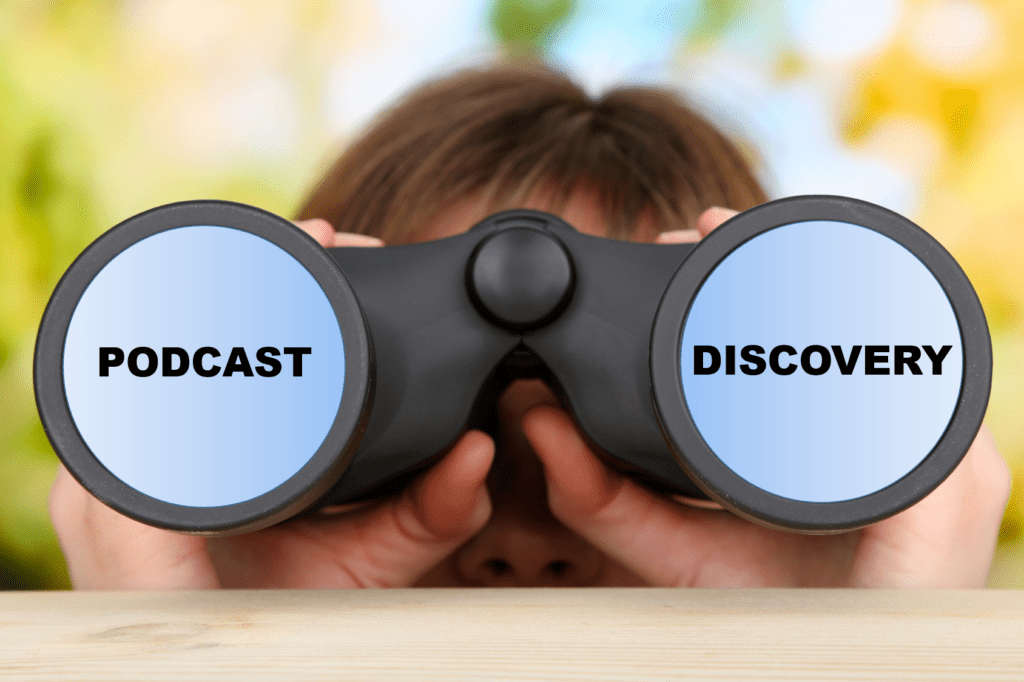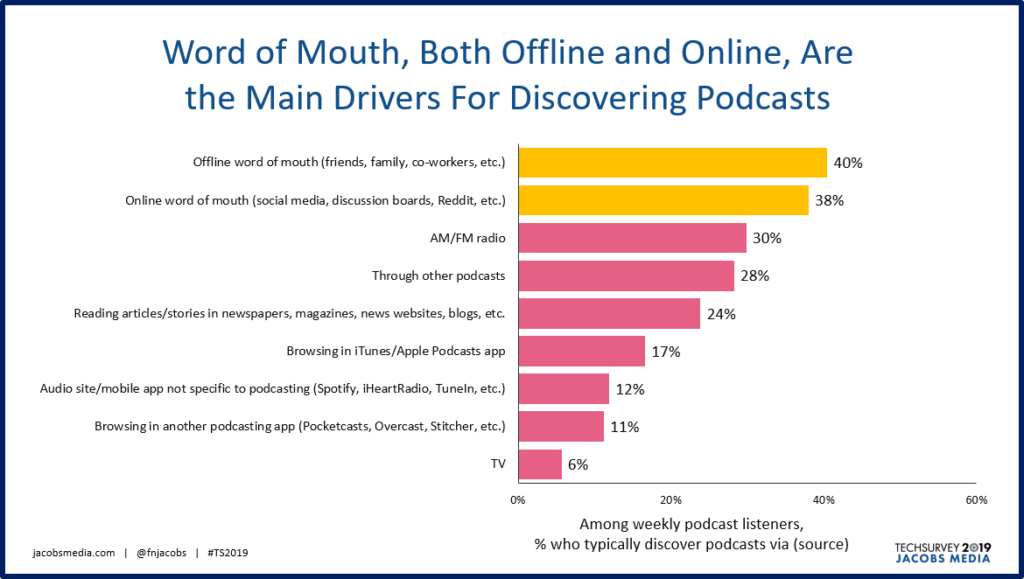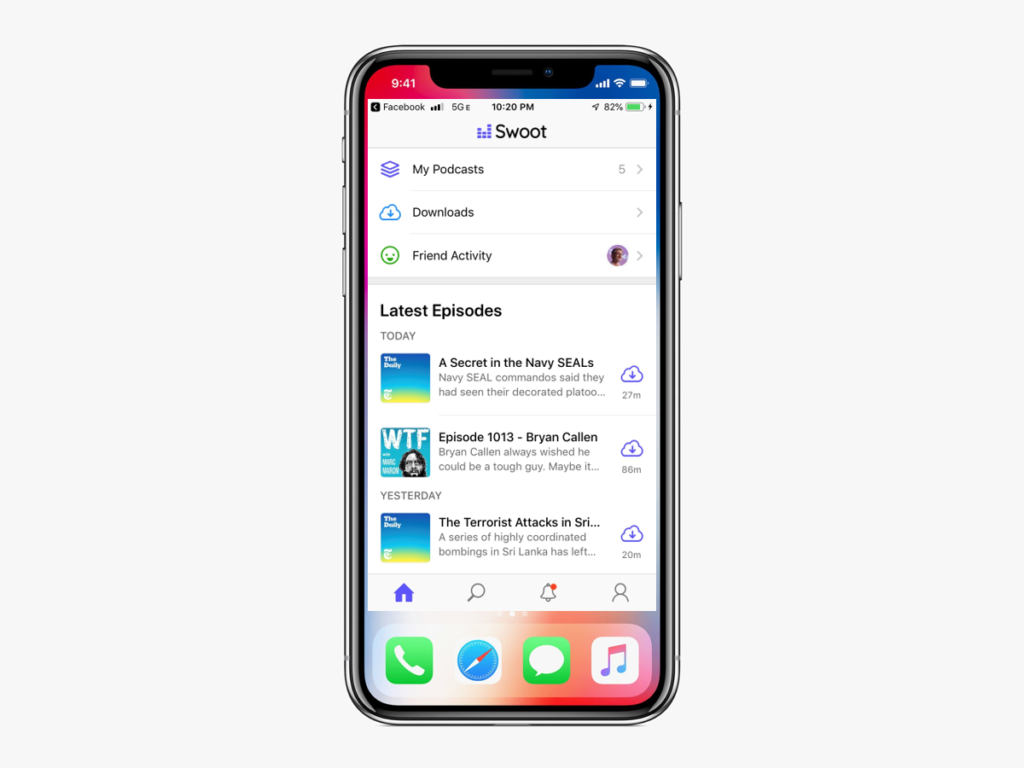
In any conversation about why it’s taking so long for podcasting to become a truly mainstream platform, the experts toss out a lot of theories. No matter how you slice it, podcasts have been around for a dozen or so years. And yet, many studies – include our commercial radio Techsurvey 2019 – indicate that roughly half of North Americans are what we call “podcast nevers” – people who just don’t listen to podcasts.
So, what’s the problem? In an environment where on-demand video has become a complete rage – who doesn’t watch Netflix, Hulu, or Amazon Prime? – on-demand audio lags well behind. Some point the finger at the notion that podcasts are too complicated. There are those who lay the blame on Google’s lack of a native podcast app on their many handsets and mobile devices. Many believe the name “podcast” is a limitation. And of course, there’s the issue of metrics – historically insufficient for both creators and marketers.
Podcasting is also beset by corporate and entrepreneurial fragmentation. The list of podcast producers, distributors, and other players continues to grow – or better put, sprawl, adding to the confusion. The many missteps committed by well-heeled startup Luminary this week underscore the immaturity of an industry that struggles for coherence.
But many point to the difficultly of simply finding good podcasts to listen to as the main culprit. And the morass – nicely called podcast discovery – is the focus of our post today. There are those who maintain that great content simply finds a way to be discovered – that brilliant podcasts will simply rise to the top based on their quality and word of mouth. And in the case of a handful of podcasts – like Serial or WTF – that is often the case.
But in an environment where there are more than 700,000 podcasts – and growing – discovering what you’re looking for or simply something good to listen to isn’t as easy as it should be. In contrast, think of the Netflix interface. In an efficient, clear fashion, it is not the least bit difficult to navigate thousands of options, many different genres, as well as the algorithmic recommendations that more often than not are pretty good in order to find a movie, documentary, or series that’s entertaining.
With podcasts, it’s a whole different story, and it’s becoming increasingly difficult to sift through the good, the bad, and the lame in a reasonable amount of time. I once heard a former NPR programming head refer to the oceans of podcasts as a content “flea market.” If you look long enough and you’re patient, you just might find a treasure.
I don’t know about you, but life’s too short to spend a lot of time looking for a piece of audio content. It simply shouldn’t be this hard. So, to learn more about podcast discovery, we included a new question in Techsurvey 2019. The idea was to learn the pecking order of how podcast consumers find this content. We came up with a list of sources, and asked those who listen to podcasts weekly or more often which one(s) they typically use for discovery.
 There’s nothing wrong with organic discovery, of course. Every medium – from music to television to live theater – can be helped by word of mouth, whether it’s people talking with each other about their favorite content or whether it’s occurring online, on social media, chats, and other places where recommendations are shared and exchanged.
There’s nothing wrong with organic discovery, of course. Every medium – from music to television to live theater – can be helped by word of mouth, whether it’s people talking with each other about their favorite content or whether it’s occurring online, on social media, chats, and other places where recommendations are shared and exchanged.
But if the podcasting platform is to reach its potential, a true discovery engine must emerge that facilitates an easy, elegant way of searching through all that content to find the good stuff.
And that’s why it should come as no surprise to any of us that a new social media platform is emerging with one main goal:
“Make it easy for users to recommend podcasts and see what their friends are listening to.”
A story in TechCrunch by Anthony Ha shines the spotlight on Swoot – a new social platform, created by the same two guys who created HipCat, a team chat app.
Pete Curley and Garret Heaton are the masterminds behind Swoot. As Ha explains, it’s about “making the listening experience more social.” Swoot is a way to easily see the podcast episodes your friends are enjoying.

Whether a discovery tool like Swoot is the missing link that will rocket podcasting into the mainstream remains to be seen. We’ve seen the power of social media on music, videos, and other pop culture phenomena, amplified by your friends and followers.
And the fact that bright minds are working hard to counteract the podcast discovery problem suggests the day will come when on-demand audio is on the same plane as its video counterpart.
It starts with making it easier to find the damn things.
- What To Do If Your Radio Station Goes Through A Midlife Crisis - April 25, 2025
- A 2020 Lesson?It Could All Be Gone In A Flash - April 24, 2025
- How AI Can Give Radio Personalities More…PERSONALITY - April 23, 2025




Making a Podcast is relatively easy, but most of those who do it are not true communicators. Like the great plastic spot of the Pacific, the Ocean of Podcasts is full of garbage, and as its use becomes more widespread it will be more difficult to find good contents.
That’s why I agree on the need to find an easy-to-use aggregator that not only allows you to classify Podcasts by themes, eras, duration, presenters and other elements, but also allows you to rate them and give them a qualification.
But deep down, I think the problem with Podcasts is not that they are good or bad or easy to find. The problem is that one thing is to sit down to watch a television program (or video) and another, very different, is to sit down to listen to a radio (or audio) program.
Sitting in front of the screen to watch a television series, a movie or a cooking show is something that you program. You need all your senses to be focused on what you are seeing so you can follow the plot and understand what is happening. You stop doing other things to see that program during the time period of the show.
So we have become accustomed since the beginning of television, but that does not happen with audio.
In radio, everyday tasks come first while radio is in the background. On the contrary, on television you first see the program. The other tasks take are incidental. The habits of listening to the radio are different. It is not common for you to stop doing what you are doing to tune into a radio program from the beginning and listen to it until the end.
In fact, according to Edison Research’s Consumer 2019 Podcast Report, 70% of those who listen to a Podcast do nothing else, but that may be precisely why Podcast consumption is so low.
On the other hand, when you turn on the radio in the car, what you are looking for is company. It does not matter if you listened to the program from the beginning or if you could not hear the end, because what interested you was having someone to accompany you on your way to work or home.
You stop doing things to watch a TV show for an hour, but when you do your homework, for example, the tasks you do while listening to the radio do not necessarily have the same duration as a radio show.
According to the U.S. Census Bureau, the average time to commute in the United States is 25.4 minutes. If you are listening to a Podcast that lasts 45 minutes or an hour, you will not be sitting in your car waiting for it to end.
Also, that is the average duration. Your trip may last less or last longer, so looking for a 25-minute program is not necessarily the solution.
According to the USDA (2014 Eating & Health Module), Americans spent an average of 37 minutes a day preparing and serving food and cleaning up. Then we should look for programs that have that duration, but that complicates the selection of topics even more.
But perhaps the most worrying fact is that the Edison Research Report tells us that only 52% listen to a complete Podcast. I do not know if this is because he/she did not like it, it was not of his/her interest or simply because he/she did not have the time.
In fact, to the question of “you would listen to a Podcast if …”, the answer of 57% was: “Had more time to listen”.
And I finish off with this figure: 26% “increase the speed of the Podcast”. The presentation of the study does not say it, but I assume it could be because they want to avoid boring moments, to see if what follows is interesting enough, or especially to reach to hear the end, because they do not have the time.
Whatever it is, we still have a lot to learn about Podcasts. The important thing is that its use is growing and that it opens new communication possibilities for the general public, and for radio stations to attract more audiences with their contents.
Thanks for your insights.
Tito, you bring up some great, well-formed thoughts that could only come froom someone who’s given the entire platform lots of consideration. Those who classify online video and online audio together miss some of the key points you bring up about the way consumers listen to “stuff,’ wherever they are, and whatever they need. I think back to the marketing guru, Clay Christensen who would put it this way: What job are you hiring a podcast to do? And what jobs do poeple hire radio to do? The answers to these questions are very different, depending of course on the person. Hope to see you at Podcast Movement. Yours observations should be heard.
There’s another element that seems absent from most discussions about podcast growth, and absent from most podcasts – music!
Most podcasts are obviously spoken word and even podcasts about the subject of music are not typically music intensive – at least partially due to copyright issues.
But there must be a significantly large percentage of radio listeners who simply prefer listening to music over any form of talk and have no inclination to switch large portions of their audio consumption to spoken word podcasts.
Doesn’t matter how easy podcasts are to find if spoken word is not the audio experience one is looking to consume.
If you consider Spotify playlist downloads in the same league as podcasts, does the whole picture look different?
Dan, indeed it does. And you are correct that some poeple just do not enjoy spoken word audio – whether its standup comedy, political comentary, drama, or true crime. Thanks for the comment.